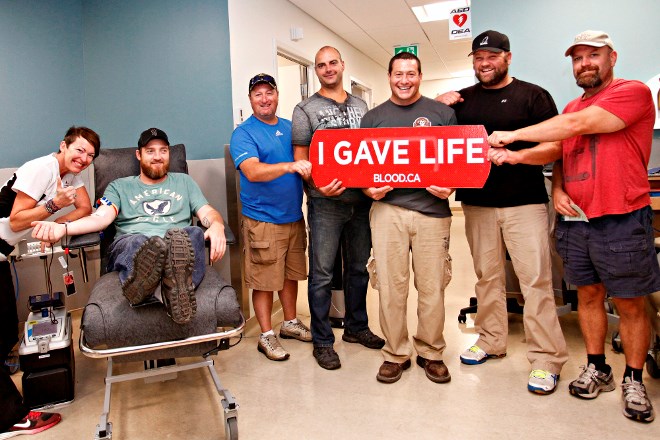About four years ago, Jersey, an employee at Vale’s Coleman Mine in Sudbury, was in a serious motorcycle accident that led to an amputation of one of his limbs.
Immediately, his workmates snapped into action, looking to help in any way they could, eventually settling on a blood drive.
“Crews are like a baseball team or a tight-knit family,” said Franco Cazzola, who was the manager at Coleman at the time and now manages the Copper Cliff smelter. “Some of them stay together for 10, 15, or 20 years because they like working with each other, and Jersey’s crew was one of those crews.”
Working with Canadian Blood Services (CBS), the crew arranged for employees to be shuttled between the mine in Levack and the CBS blood donation centre in Sudbury during the mine’s Business Days — one day every month crews spend on surface as an education day.
“It got such a big uptake after the first couple of sessions that the employees requested to keep it going,” Cazzola said. “It just became a part of the culture that every Business Day there would be an opportunity to donate blood.”
That commitment has endured, and today, every month, roughly 80 mine workers spend 90 minutes of their Business Day giving ‘the gift of life.’
Coleman’s employees have even challenged other plants to donate, and many employees were quick to get on board, including Dan Langlois, a supervisor at Stobie Mine who knows from personal experience the importance of giving blood.
He first donated when his grandfather was diagnosed with leukemia and needed blood transfusions to extend his life.
Langlois and his grandfather shared a blood type, and he gladly donated to help buy him more time with his grandfather.
“Time is the most precious resource that we have,” Langlois said. “We’re in the mining world, and we mine precious metals, but you can’t replace time. It’s a non-renewable resource.”
Joanne Drake, territory manager for CBS, said corporate donations are a key component to meeting the local blood collection targets set out by CBS every month.
The practice is doubly beneficial, as businesses and organizations can give back to the communities in which they operate, while the local stock of blood is kept in good supply.
“A lot of organizations are looking for teambuilding exercises that their staff can do,” Drake said. “What better way than to come into the clinic as a group? You save lives and it’s a really good feeling.”
The CBS clinic in Sudbury is a hub for blood collection across Northern Ontario. From there, mobile collection clinics are sent every couple of months to communities along the North Shore of Lake Huron, as well as Kirkland Lake, Timmins, New Liskeard, North Bay and Sault Ste. Marie.
But recruitment is a constant challenge, Drake said. Each year, CBS’s Sudbury hub loses about 40 per cent of its donors, yet it requires 200 new donations every month just to keep up with hospital demand. Only 3.4 per cent of eligible donors in Canada give blood.
The local clinic has been under even more strain in recent months after CBS implemented more stringent donation guidelines with regard to donors’ iron and hemoglobin levels.
Drake is hopeful more corporate and business donors will come on board, since they can reach out to a wide network of potential donors to which CBS wouldn’t normally have access.
Any size of business can participate.
“Not only are you saving lives, but you’re profiling your organization at the same time,” she said.
In addition to participating in group donations as Vale does, businesses can also “adopt” a clinic.
Through this avenue, a company will promote the blood donation clinic to clients and other networking circles — via social media and more traditional marketing methods — to recruit as many donors as possible, with employees often donating themselves. In turn, CBS will promote the company at the Sudbury clinic.
In March, when Nickel City Insurance Brokers adopted its first clinic, all 10 employees were involved in recruitment and promotion efforts.
It was such a success, one video promoted on the company’s Facebook page received 5,600 views. Following the weeklong clinic, CBS had collected more than its target, and a host of new people had signed up as donors.
President Russell Fraser said the company tries to participate in the community in various ways, but the very nature of his industry brings home the importance of a readily available blood supply.
“I think it’s important for people to know the impact of the Adopt-a-Clinic and using your corporate responsibility to help with getting awareness out there for people to go and donate blood,” Fraser said. “It really doesn’t take a lot of time, and it has a huge impact on our community.”
He’s since challenged other businesses to donate blood and is working on adopting a second clinic leading up to the long weekend in May, a crucial time for donations.
In what is perhaps a sign of the times, Drake has noticed that companies are cutting back on spending, and it can be equally difficult to take time away from the office.
But Drake emphasizes the importance of CBS’s request: it requires no money, only time, and 100 per cent of the donation goes directly to the patient.
“People do it for different reasons,” Drake said. “Mostly you feel really good after you donate, because you know you’ve made an impact on a patient’s life.”




